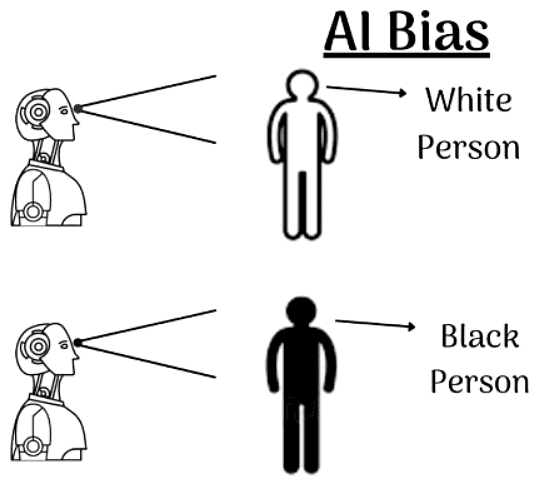AI-Ethics | Artificial Intelligence for Class 10 PDF Download
| Table of contents |

|
| What is AI Ethics? |

|
| Ethical concerns of AI |

|
| What is AI bias? |

|
| What is Data privacy? |

|
What is AI Ethics?
AI ethics focuses on the moral implications and responsibilities associated with artificial intelligence. It examines how to ensure that AI technologies are developed and used in ways that align with ethical principles and human values.
Key Points in AI Ethics:
- Ethics and Philosophy: Ethics is a branch of philosophy that explores the principles of right and wrong. It provides a framework for making decisions and forming beliefs about what is morally acceptable.
- Moral Obligations: AI ethics deals with the moral obligations and duties of individuals and organizations involved in the development and deployment of AI technologies.
- Human Decisions: Despite the technological nature of AI, the decisions about how AI is used and what ethical standards are applied are made by people. Therefore, ethical considerations in AI involve human judgment and responsibility.
- Frameworks for Decision-Making: Ethical frameworks are used to guide decisions about AI development and use, ensuring that these technologies are aligned with broader societal values and norms.
- Addressing Ethical Questions: AI ethics seeks to address questions about the impact of AI on society, such as privacy, fairness, transparency, and accountability.
By integrating ethical considerations into AI development and use, we aim to create technologies that benefit society while minimizing potential harms.
Ethical concerns of AI
Can AI assure this:

The development and deployment of AI bring both opportunities and challenges, including several ethical and societal concerns:
- Unemployment: AI and automation can lead to job displacement, as machines and algorithms take over tasks previously performed by humans, potentially contributing to increased unemployment rates.
- Efficiency Concerns: Over-reliance on AI for decision-making and problem-solving may diminish human efficiency and critical thinking skills, as individuals may become accustomed to deferring to technology.
- Wealth Inequality: The benefits of AI could disproportionately favor wealthy individuals and companies, exacerbating economic disparities. Wealthier entities may gain more from AI advancements, while those in lower socioeconomic positions may face job losses and reduced opportunities.
- Reduced Human Interaction: The proliferation of AI and automation may lead to decreased human interaction and social engagement, as machines handle tasks and communication that people used to manage themselves.
- Misalignment with Human Desires: AI systems may not always align perfectly with human goals or preferences, leading to outcomes that may not meet the desired expectations of users.
- AI Bias: AI systems can inherit biases present in their training data, leading to biased or unfair outcomes. This phenomenon, known as AI bias or racism, can perpetuate and amplify existing social inequalities.
Ultimately, the impact of AI depends on how humans choose to develop, implement, and regulate these technologies. Responsible and ethical use of AI can maximize its benefits while mitigating potential negative consequences.
What is AI bias?

AI Bias refers to the tendency of AI systems to produce results that are unfairly prejudiced due to biased training data. When an AI model is trained on biased data, it learns and perpetuates these biases, leading to skewed outcomes.
Examples of AI Bias:
- Machine Voices: Many artificial assistants have traditionally used female voices, which can reinforce gender stereotypes and biases.
- Google Recommendations: Algorithms may reflect and perpetuate existing biases in content recommendations, potentially skewing the distribution of wealth or opportunities created by AI technologies.
- Search Results: AI systems might impact behavior and interactions by presenting biased or skewed information in search results, influencing users' perceptions and decisions.
- Facial Recognition: AI systems trained with a narrow or unrepresentative dataset might have poor accuracy across different races or genders. For example, facial recognition systems trained on predominantly one race may struggle to accurately recognize individuals from other racial groups.
- Security Systems: Systems trained to identify potential criminals based on biased data might unfairly target specific races or genders, rather than focusing on actions and behaviors relevant to criminal activity.
- Court Systems: AI models used for legal decisions might inherit biases from historical rulings, leading to unfair judgments against certain racial or demographic groups.
To mitigate AI bias, it is crucial to ensure that data used for training is diverse and representative, and that ongoing efforts are made to review and correct biases in AI systems.
How to avoid AI bias?
AI Access in simple terms means making AI technology available to everyone, not just a privileged few:
- Access Gap: There is a disparity in access to AI technology between the wealthy and those below the poverty line. Wealthier individuals or organizations can afford AI-enabled devices, while less affluent people may not.
- Widening Divide: As technology advances rapidly, the gap between those who can access AI and those who cannot continues to grow, leading to increased inequality.
- Government Role: To address this issue, governments should work to provide infrastructure and resources that make AI technology accessible to all, including common students and people.
- Equal Opportunity: Ensuring broad access to emerging technologies like AI helps to create a more balanced society where everyone has the opportunity to benefit from technological advancements.
What is Data privacy?

Data Privacy is the ability to control how your personal data is stored, modified, and shared among various entities.
As technology advances and Artificial Intelligence becomes increasingly integrated into our daily lives, it raises significant concerns about data privacy.
Here’s a breakdown:
- Integration with Daily Life: AI is used across various industries to enhance products and services, making it crucial to handle personal data carefully.
- Data Usage: Machine learning algorithms often rely on vast amounts of personal data to improve their performance, which intensifies the need for stringent privacy measures.
- Privacy Laws: To protect personal data, regulations like the EU General Data Protection Regulation (GDPR) and the California Consumer Privacy Act (CCPA) mandate strict data protection practices.
- Consumer Protection: Ensuring compliance with these privacy laws is essential to safeguarding consumer data and maintaining trust.
|
24 videos|92 docs|8 tests
|
FAQs on AI-Ethics - Artificial Intelligence for Class 10
| 1. What are some common ethical concerns related to AI? |  |
| 2. What is AI bias and how does it impact decision-making processes? |  |
| 3. How can organizations address AI bias to ensure fairness and equity in their systems? |  |
| 4. What is data privacy and why is it important in the context of AI ethics? |  |
| 5. How can individuals protect their data privacy in the age of AI? |  |




















